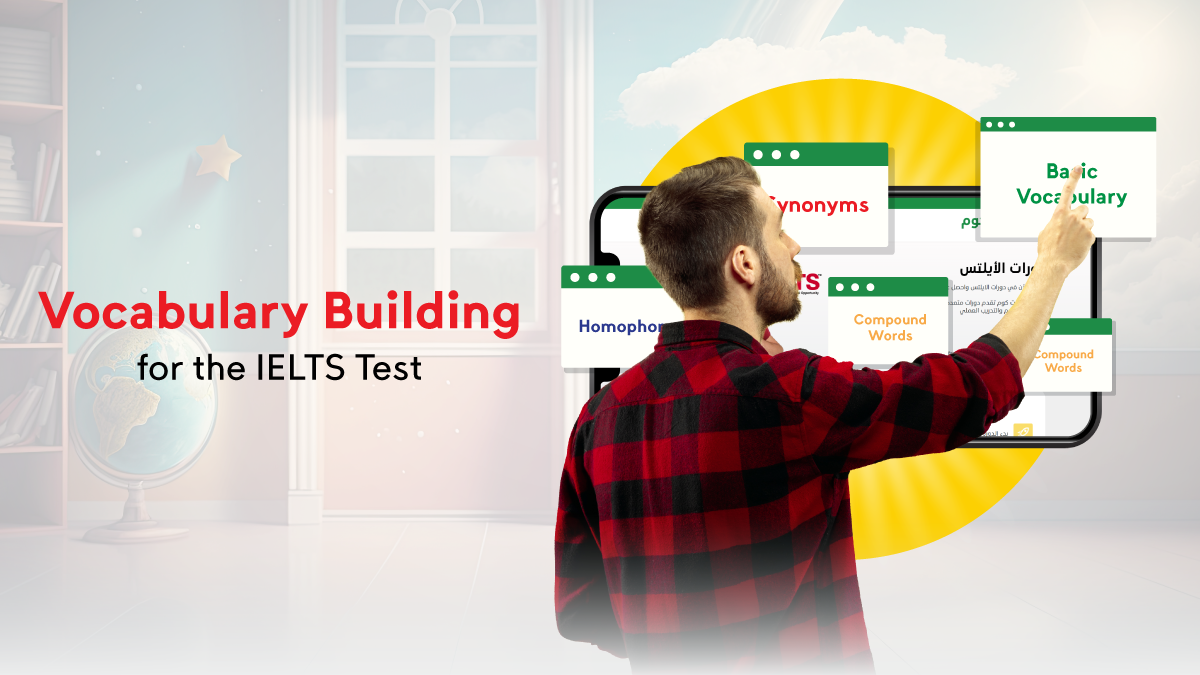
Vocabulary is a fundamental and vital part of the IELTS Test, where performance evaluation in reading, writing, listening, and speaking heavily depends on the use of appropriate and accurate vocabulary. Therefore, expanding your knowledge of English vocabulary can have a significant impact on your ability to achieve a high score on the test.
In this article, we will explore a variety of effective strategies you can use to boost your vocabulary knowledge for the IELTS test, and enhance your ability to use English effectively and confidently.
The Importance of Vocabulary in the IELTS Test
Vocabulary plays a crucial role in achieving success in the IELTS Test. In all test sections, whether reading, writing, listening, or speaking, vocabulary is a fundamental component of evaluation.
- Having a broad range of vocabulary can help you understand study materials better, provide more accurate and detailed responses, and communicate more effectively. Furthermore, the vocabulary you know can demonstrate your ability to deal with a variety of topics and situations in English.
- Not only is extensive knowledge of vocabulary important, but also the ability to use it correctly in the appropriate context. The ability to use precise and suitable vocabulary can give a good impression to the examiner and increase your chances of getting a high score.
- Moreover, your vocabulary can reflect your ability to express complex ideas, make distinctions between nuances, and deal with complicated topics, all of which are important skills valued in the IELTS Test.
Overall, vocabulary is a crucial part of preparing for the IELTS Test, and a lot of attention should be given to learning and practicing a variety of vocabulary.
Understanding the Basics of Vocabulary in English
Understanding the basics of vocabulary in English can be extremely important in boosting your language skills and improving your chances in the IELTS test. Knowing words and how to use them correctly can make a big difference in your ability to communicate effectively. Here are some things you should know about the basics of vocabulary in English:
Basic Vocabulary:
- These are the most common words in English, including words like “the”, “is”, “at”, “which”, and “and”.
- Knowing these words and how to use them correctly can help you better understand texts and conversations.
Synonyms:
- These are words that have a similar or identical meaning. Knowing synonyms can help you diversify your speech and writing, making it more interesting and accurate.
Words with Multiple Meanings:
- Many words in English have multiple meanings based on the context they’re used in. For example, the word “run” can mean “to jog”, “to manage”, or “to operate”, depending on the context.
- Understanding these words can help you better understand and interpret texts.
Compound Words:
- These are words that are formed from two or more words to create a new meaning. Like “blackboard” or “haircut”.
- Understanding this type of words can help you better understand English and increase your vocabulary.
Homophones:
- These are words that sound and look similar but have different meanings. Like “piece” and “peace” or “bare” and “bear”.
- Understanding the differences between these words can help avoid confusion.
Knowing these basics can greatly enhance your understanding of vocabulary in English and boost your readiness for the IELTS test.
Effective Strategies for Increasing Vocabulary Knowledge in the IELTS Test
Increasing your vocabulary knowledge is a crucial element for good performance in the IELTS test. Here are some effective strategies you can use to expand your lexical repertoire:
Broad Reading:
- Reading can expose you to new words and phrases.
- Try to read regularly and choose a variety of genres, including novels, news, academic journals, and blogs.
Using Vocabulary Cards:
- Create cards with each new word you learn, including its definition, an example of use, and any associated notes.
- Review these cards regularly to reinforce your memory.
Using Apps:
- There are numerous apps that assist in improving vocabulary knowledge, through games, quizzes, and other exercises.
Daily Writing:
- Try writing every day, whether it be short essays, diaries, or emails.
- Writing can help apply the words you’ve learned in context.
Learning Words in Context:
- Rather than learning words on their own, try learning them as part of a sentence or paragraph.
- This helps you understand how the word can be correctly used.
Regular Review:
- Don’t forget to regularly review the vocabulary you’ve learned to ensure it stays in your memory.
By using these strategies, you can continuously improve your vocabulary knowledge and boost your performance in the IELTS test.
How to Use Reading to Improve Vocabulary Knowledge
Reading is a powerful and useful tool for improving vocabulary knowledge. Here’s how you can effectively use it:
- Diverse Reading: Make sure to read different types of texts – novels, news, academic articles, blogs, etc. This will expose you to new words and phrases in a wide range of contexts.
- Intensive Reading: When you come across a word you don’t know, don’t simply skip over it. Instead, take a pause and look up its meaning. Try to understand it from the context first, then use a dictionary to confirm.
- Active Reading: Try to be active while reading. Use colored pens or similar tools to highlight new words and mark sentences where the word is in context. Writing notes about new words and phrases can also be an effective way to enhance your knowledge of them.
- Creating Vocabulary from Readings: After finishing reading a text, make a list of the new words you have learned. You can review this list regularly to help reinforce your memory of these words.
- Regular Reading: Try to read daily. The more you read, the more you are exposed to new words and phrases.
Remember, the goal of reading is not just to improve vocabulary, but also to understand how words and phrases can be used in context, which is an important part of comprehending and fluently using the language.
Common Mistakes in Learning Vocabulary and How to Avoid Them
Learning vocabulary in English can be a significant challenge, especially for those learning it as a second language. But a good understanding of common mistakes can help avoid them and enhance language learning. Here are some common mistakes and tips to avoid them:
- Learning Words Without Context: Many students try to memorize words without any context or usage. But this can make them hard to understand or remember. Instead, try learning words as part of a sentence or story where you can understand how to use them correctly.
- Relying on Literal Translation: While translation can be helpful, relying heavily on it can be misleading, as words in English can carry multiple meanings depending on context. Try to understand the core meaning of the word and how it can change based on context.
- Ignoring Common Words: Some students focus on learning new and rare words and ignore the most common ones. But common words are the most frequently used, so focus should be on learning them.
- Ignoring Pronunciation: Correct pronunciation of words can make a difference in your understanding of them and your ability to use them fluently. Use apps or dictionaries that provide the correct pronunciation of words.
- Learning Without Reviewing: Learning new words requires regular review to ensure they stay in memory. Use flashcards or educational apps to help you review regularly.
learning language requires patience and continuous practice. Don’t rush and continue to enhance your vocabulary knowledge in English based on your needs and goals.
Preparing for the IELTS Test with elmadrasah.com Courses
elmadrasah.com Courses are an excellent option for preparing for the IELTS Test and achieving high scores. It is an online educational platform that offers specialized courses for the IELTS test, aimed at providing learners with the necessary skills and strategies for exam success.
Through elmadrasah.com Courses, you will benefit from several educational advantages that will aid you in effective IELTS exam preparation:
Specialized Educational Content:
- elmadrasah.com Courses provide specialized and well-organized educational content for each section of the IELTS Test.
- You will find detailed lessons covering listening, reading, writing, and speaking, enabling you to understand the test format and tackle various question types.
Expert Training:
- Qualified instructors at elmadrasah.com Courses offer the necessary guidance and support during your preparation period.
- You will receive specialized training from professional teachers with experience in teaching English and the IELTS test.
- These trainers will provide the assistance and guidance you need in each section of the test.
Practice Exercises and Mock Tests:
- You will find numerous practice exercises and mock tests in elmadrasah.com Courses. These exercises will help you apply the concepts taught and improve your language proficiency.
- Regularly solving these exercises will help you identify strengths and weaknesses and work on enhancing your performance.
Flexibility in Schedule:
- You can access elmadrasah.com Courses’ lessons at any time that suits you.
- You will have a flexible schedule, allowing you to determine your study time according to your personal schedule. You can conveniently access the content as per your preference.
Feedback and Support:
- You will receive direct feedback from instructors regarding your performance and improvements.
- You will receive the guidance and advice you need to enhance your performance and work on specific areas that require development.
With elmadrasah.com Courses, you can confidently IELTS Preparation and achieve high scores. Benefitting from customized lessons and professional guidance will help you develop comprehensive language skills and improve your performance in the test. Start preparing now with elmadrasah.com Courses and successfully achieve your goals in the IELTS Test.















